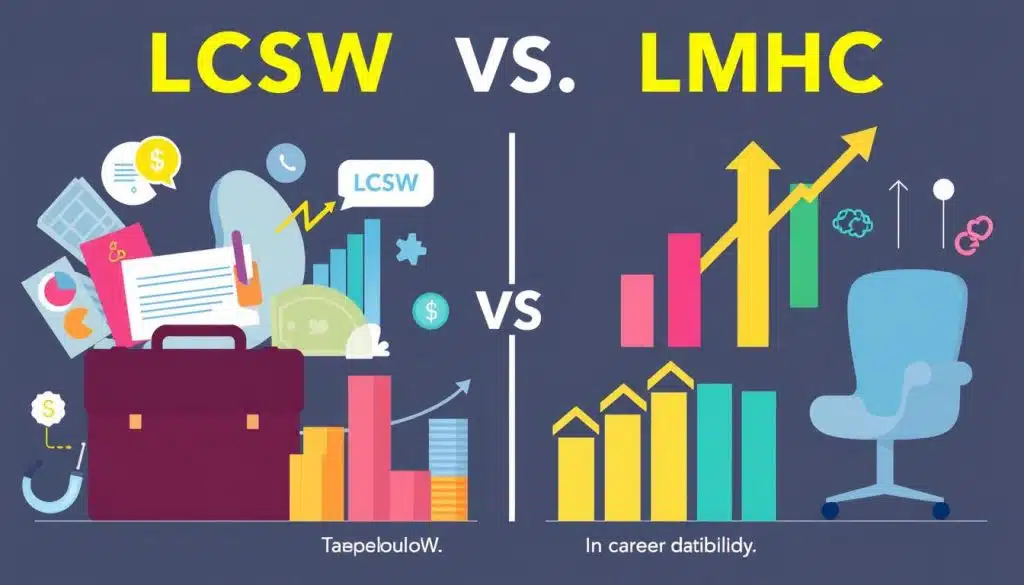Many people ask about the difference between a Licensed Clinical Social Worker (LCSW) and a Licensed Mental Health Counselor (LMHC). At Social Work Exam Strategies, we help you understand these roles. We aim to support you in becoming a licensed social worker. Knowing the difference between LCSW and LMHC is key to choosing your career.
The lmhc meaning and lmhc license requirements are important to think about. The debate between LCSW and LMHC is ongoing. But we’re here to give you the info you need to decide.
The comparison between LCSW and LMHC goes beyond education. It also involves practice settings and career outlook. By exploring these differences, you’ll understand which path is best for you. Whether you’re leaning towards LMHC or LCSW, we’re here to support you.
You might be asking what is the difference between an lcsw and an lmhc? Exploring social work and mental health counseling, we see LCSW and LMHC roles are unique. LCSWs focus on mental health evaluations and emotional support. LMHCs concentrate on counseling for individuals, groups, and families. Both are vital in helping communities.
Choosing a career in these fields means knowing the LCSW and LMHC differences. LCSWs need 900 to 1,200 hours of field education and 3,000 to 4,000 hours of experience. LMHCs require a master’s degree and 1,600 to 4,000 hours of experience. This shows each profession has its own path and duties.
Practice settings vary between LCSWs and LMHCs:
Knowing the roles of LCSWs and LMHCs helps in choosing a career. Whether aiming for an LCSW or LMHC, both are crucial for mental health support. They play key roles in promoting well-being.
| Profession | Practice Settings | Services Provided |
|---|---|---|
| LCSW | Hospitals, clinics, private practice | Mental health evaluations, emotional support, case management |
| LMHC | Schools, community agencies, private practice | Individual, group, and family counseling services |
We’re here to help you become a licensed social worker. Our team is ready to support and guide you. To be a Licensed Mental Health Counselor (LMHC) or a Licensed Clinical Social Worker (LCSW), you must meet certain requirements. The lmhc degree needs a master’s in counseling, while LCSWs require a master’s in social work.
LCSWs and LMHCs have different education and licensure needs. LCSWs pass the ASWB exam, while LMHCs take the National Clinical Mental Health Counseling Exam or the National Counselor Examination. It’s crucial to know the specific needs for each profession when looking at lcsw vs lmhc qualifications. Also, lcsw vs lmhc licensure rules can change by state, affecting internship or supervised work periods.
Here are the main differences in education and licensure:

When looking at the career outlook and salaries for LCSW and LMHC professionals, it’s key to understand the lcsw vs lmhc salary differences. LMHCs make an average of $61,000 a year. LCSWs, on the other hand, earn about $65,500 annually.
The lcsw vs lmhc education requirements also shape their career paths. Both need a master’s degree. LCSWs have a degree in social work, while LMHCs have one in counseling. The lmhc vs lcsw debate often revolves around their areas of focus. LCSWs are trained in case management and mental health support. LMHCs focus more on individual counseling and psychological factors.
Here is a lcsw lmhc comparison of the average salaries for LCSW and LMHC professionals:
| Professional | Average Annual Salary |
|---|---|
| LCSW | $65,500 |
| LMHC | $61,000 |

When deciding between becoming a Licensed Clinical Social Worker (LCSW) or a Licensed Mental Health Counselor (LMHC), think about your goals and interests. Both LCSW and LMHC professionals are crucial in mental health and social services. But, they focus differently.
If you love providing care that covers mental health, social services, and advocacy, LCSW might be for you. LCSWs help many groups, like new parents, the LGBTQIA+ community, and seniors. They tackle various mental health issues. On the other hand, if you enjoy counseling, LMHC could be your best fit.
Your choice between an LCSW and an LMHC career depends on your preferences and goals. No matter your choice, you’ll help improve mental health in your community.